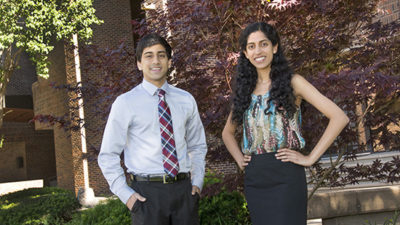UMKC research finds health hazards associated with marijuana use
For generations, marijuana has been the most commonly used illicit drug in the United States and is considered to have few adverse effects. So little that Alaska, Colorado, Oregon and Washington are states that have legalized recreational marijuana and more states are considering decriminalization.
How marijuana affects health is an understudied topic. But a recent study by two second-year University of Missouri-Kansas City School of Medicine students, Kavelin Rumalla and Adithi Y. Reddy, and Manoj K. Mittal M.D., an assistant professor at the University of Kansas Medical Center, shows evidence that recreational marijuana use might be associated with harmful health effects to the heart and brain.
“While we are politically neutral on the topic of marijuana, we believe society deserves to know about its potential health consequences,” said Rumalla, lead author on the manuscript.
Rumalla and Reddy, who began their research as first-year students, investigated the relationship between marijuana use and hospitalization for acute ischemic stroke, called AIS, using data from the largest inpatient database in the United States — 20 percent of hospitalizations in the U.S. record each year from 2002 to 2011. AIS is the most common type of stroke and is nearly 10 times more common than hemorrhagic stroke. AIS is also the third leading cause of death; and the leading cause of serious, long-term disability; in the United States. AIS affects approximately 795,000 Americans each year.
The study, “Recreational marijuana use and acute ischemic stroke: A population-based analysis of hospitalized patients in the United States,” was recently published in the Journal of the Neurological Sciences.
“There’s a gap in public knowledge about the health effects of marijuana,” Reddy said. “The challenge is that it’s difficult to research marijuana in a widespread prospective clinical study because it is illegal in most parts of the country. This makes epidemiological studies like ours even more important at this point in time.”
The study compared the incidence of stroke among 2,496,165 marijuana users and 116,163,453 non-users. Their conclusion is that marijuana use was independently associated with an increased likelihood of stroke hospitalization in adults ages 15 to 54, with an even stronger association in the younger adult (ages 15 to 24) population.
The research also supported that marijuana is a gateway drug, as those who used marijuana were more likely to use other substances including tobacco and cocaine.
“That’s even more hazardous to health when combined with marijuana use,” Rumalla said. However, the study controlled for the potential confounding effect of these substances, along with other characteristics, when evaluating the independent association between marijuana use and stroke.
This is important research,” said Steven L. Kanter, dean of the UMKC School of Medicine and a neurosurgeon. “The prevailing thought about marijuana use is that there aren’t that many side effects. But this study shows us that recreational marijuana usage independently associates with hospitalizations for stroke. And life after a stroke can be most difficult.”
The aftermath of a stroke can include physical weakness, numbness and stiffness; emotional experiences, changes and problems; and the process of thinking, remembering and recognizing things can become challenging, according to the National Stroke Association.

